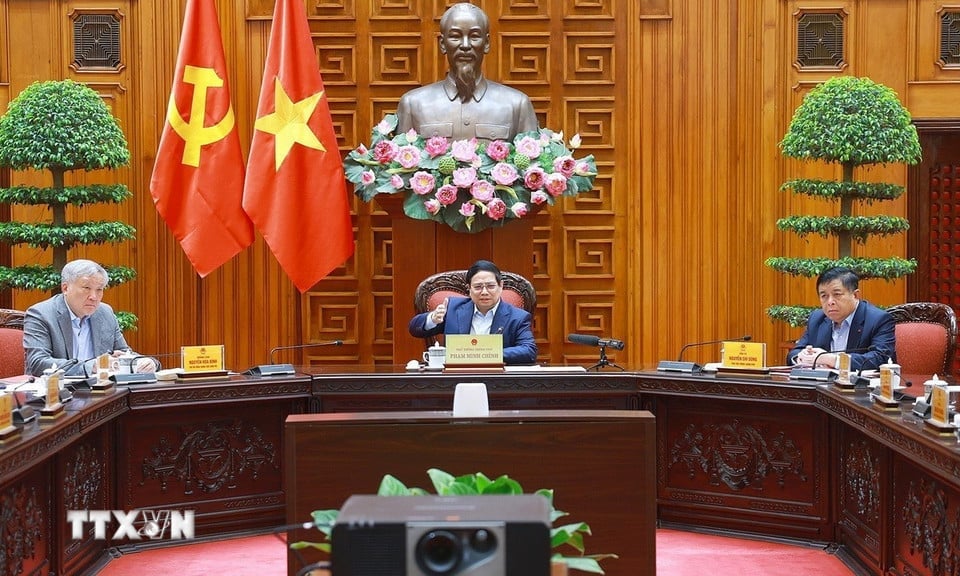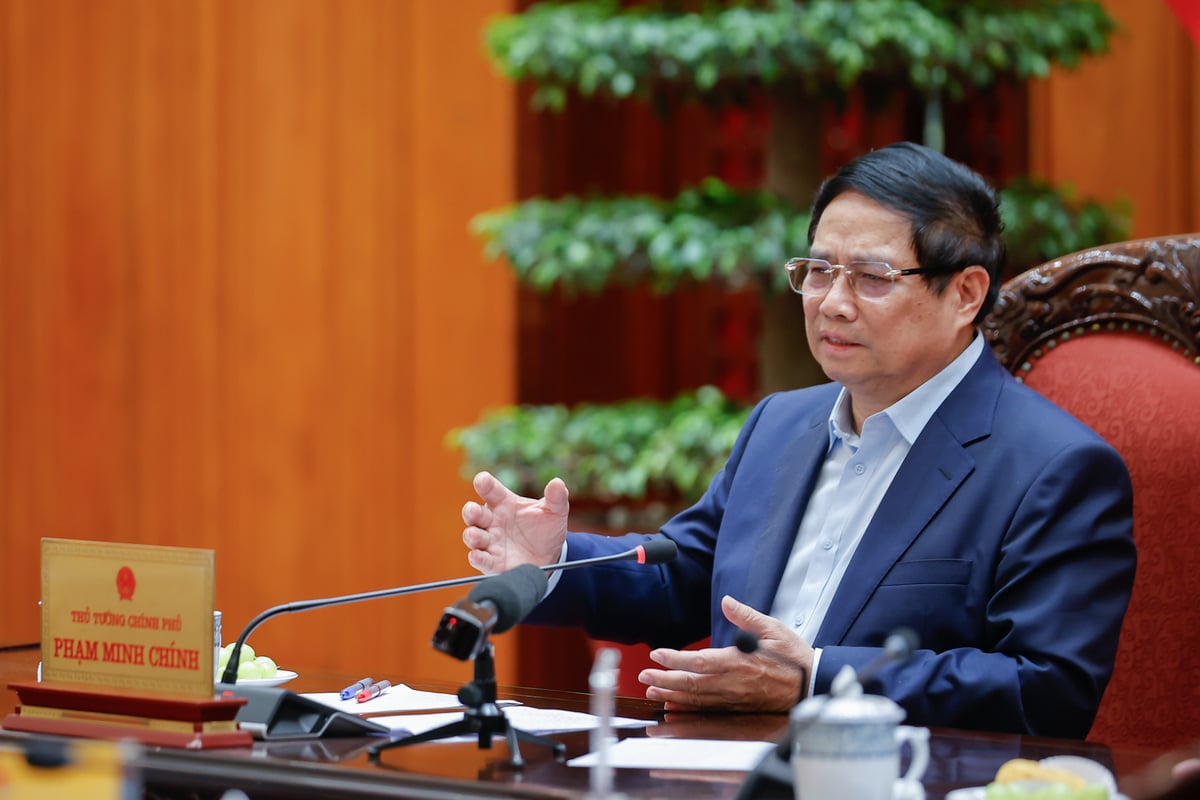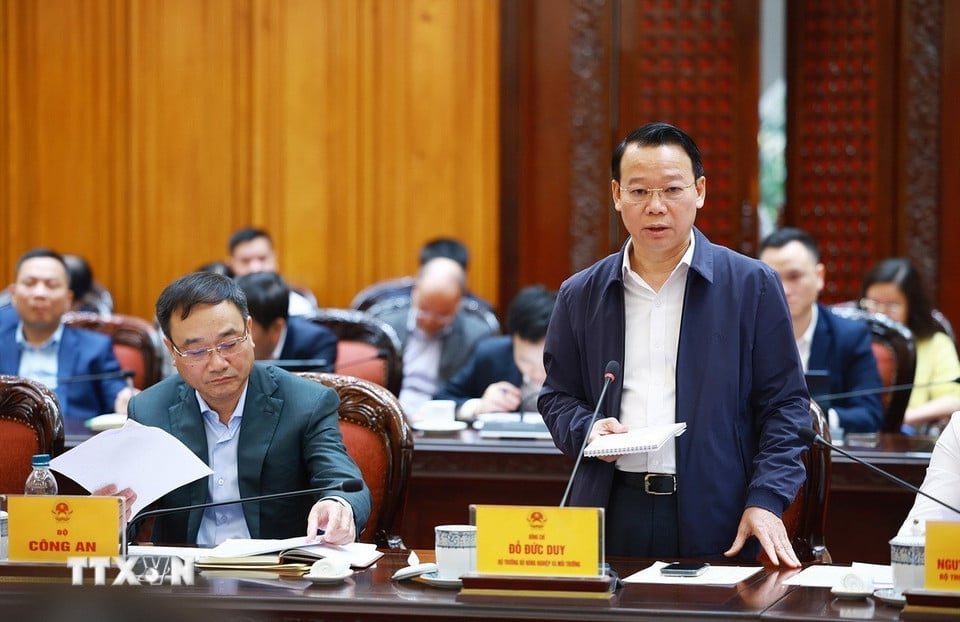June 18, 2025 | 01:17 GMT +7
June 18, 2025 | 01:17 GMT +7
Hotline: 0913.378.918
June 18, 2025 | 01:17 GMT +7
Hotline: 0913.378.918
The meeting with ministries and governmental agencies, chaired by Prime Minister Pham Minh Chinh, was convened immediately after US President Donald Trump announced a 46% reciprocal tariff on imports from Vietnam.
After listening to reports from ministries, agencies, and government leaders, Prime Minister Pham Minh Chinh emphasized that the current situation indicates increasingly fierce, complex, and unpredictable trade competition. In recent times, Vietnam has made significant efforts to implement comprehensive and coordinated solutions across political, diplomatic, economic, and people-to-people exchange fronts to respond to these challenges.

Prime Minister chairs a meeting on the US's new tariff rates on Vietnamese goods. Photo: VNA.
In the coming period, the Prime Minister requested that ministries and sectors remain calm, resilient, and proactive, with flexible, timely, and effective strategies to continue overcoming difficulties, obstacles, and external shocks as they have in the past years amidst the pandemic, global conflicts, and supply chain disruptions.
Along with directing a number of comprehensive, balanced, and effective measures for both the short-term and long-term, the Prime Minister called for the immediate establishment of a rapid response team on this issue, headed by Deputy Prime Minister Bui Thanh Son. Deputy Prime Minister Ho Duc Phoc was assigned to lead and coordinate with ministries and sectors to listen to the opinions of businesses, including major export companies.
The Prime Minister emphasized that this is also an opportunity to affirm the resilience and strength of the nation; an opportunity to restructure the economy towards rapid but sustainable development, with a focus on green transformation, digitalization, science and technology, and innovation; promoting the construction of an independent and self-reliant economy that is deeply and effectively integrated into the international community; expanding and diversifying markets, products, and supply chains; fostering domestic production; and tapping into domestic markets and resources.

The Prime Minister emphasized that the goal of achieving a GDP growth rate of 8% or more in 2025 remains unchanged. Photo: VGP.
Earlier, on the morning of April 3, President Trump announced a tariff schedule for 50 trade partners. According to Mr. Pham Quang Huy, Agricultural Counselor of Vietnam in the United States, Vietnam was accused of imposing a 90% tariff on U.S. goods; therefore, the reciprocal tariff applied to Vietnamese goods was set at 46% (calculated as 50% of the tariff that the foreign country imposes on U.S. products).
However, for some countries, the reciprocal tariff matches the rate they apply to US goods - for example, Brazil was assigned a 10% tariff, as it imposes a 10% tariff on US goods.
Mr. Pham Quang Huy stated that during the announcement, President Trump referenced the recently released USTR trade barrier report, as well as the reciprocal tariff schedule submitted to him by the Secretary of Commerce during the ceremony.
Among ASEAN countries, only Brunei was not mentioned in the tariff list. The imposed tariff rates are as follows: Thailand – 36%, Indonesia – 32%, Malaysia – 24%, and Singapore – 10%.
Certain goods will be exempt from the reciprocal tariffs, including: (1) Items subject to tariffs under 50 USC 1702(b); (2) Steel, aluminum, automobiles, and auto parts already taxed under Section 232; (3) Copper, pharmaceuticals, semiconductors, and wood products; (4) All items that may be subject to future tariffs under Section 232; (5) Bullion gold; and (6) Energy and certain minerals unavailable in the U.S.

Minister of Agriculture and Environment Do Duc Duy speaks at the meeting. Photo: VNA.
According to the interpretation of some experts who have analyzed President Trump’s Executive Order, it remains unclear whether the general 10% tariff on all nations, set to take effect on April 5, 2025, will be combined with the reciprocal tariffs imposed on 60 specific countries starting April 9, 2025.
The executive order reflects the consistent stance of the current administration, emphasizing that the application of US tariffs is no longer solely an economic issue but has escalated into a national emergency threatening the security and livelihoods of American citizens. These tariff measures will remain in effect until President Trump determines that the threats posed by the trade deficit and the fundamental lack of reciprocity have been addressed or significantly reduced.
The executive order also stipulates that the US Customs and Border Protection (CBP) will issue guidelines on how to impose tariffs on goods of US origin, based on a minimum U.S. content threshold of 20% in imported products.
Regarding this matter, in a statement on the morning of April 3, just hours after President Donald Trump announced the reciprocal tariff order against US trading partners. Chinese Ministry of Commerce spokesperson He Yadong emphasized: "China firmly opposes this decision and will take strong countermeasures to protect its rights and interests."
"The United States declared that it has suffered losses in international trade and has raised tariffs on all its trading partners under the so-called principle of 'reciprocity'. However, this approach fails to account for the balance of interests achieved through years of multilateral trade negotiations," Mr. Ha said.
Meanwhile, global stock markets and international trading reacted negatively to the new tariff policy. Nasdaq futures extended losses to as much as 4% in early trading today, while S&P 500 futures dropped more than 3%.
Apple's stock fell over 7% after market close, Nvidia declined more than 5%, and Tesla also dropped over 6% in after-hours trading.
Translated by Kieu Chi

(VAN) The results of national programs are essential for establishing a contemporary livestock sector that is well-equipped to meet the demands of both domestic and international markets, with robust biosafety standards.

(VAN) The UNESCO Global Geopark revalidation of Non nuoc Cao Bang and the transition to a two-tier administrative model are presently undergoing a pivotal moment in Cao Bang, the northernmost province of Vietnam.
/2025/06/13/5330-2-004539_953.jpg)
(VAN) Changing policy mindset and removing investment barriers are urgent requirements to open up new development space for enterprises in the agricultural sector.

(VAN) The areas include the restoration of five million hectares of marine ecosystems.

(VAN) Dr. Le Van Nguyen, Director of the Institute of E-Commerce Management (ECM), emphasizes the potential for green development through the cultivation of fruit trees, particularly in provinces such as Son La.

(VAN) VAAS and numerous Vietnamese enterprises have signed cooperation agreements with Japanese partners to promote agricultural technology and trade connectivity.
/2025/05/29/5625-12-214801_567.jpg)
(VAN) Provincial mergers in the Mekong Delta promise to streamline administration, expand inter-provincial raw material areas, and foster close linkages in agricultural value chains, benefiting both businesses and cooperatives.